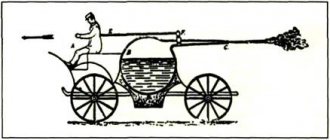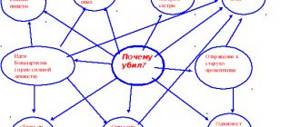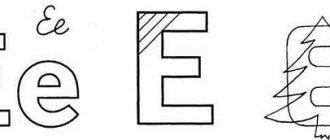Download material
so UNT / Russian literature / Lesson plans for Russian literature 9th grade
Lesson 38 LYRICAL HERO OF LERMONTOV'S POETRY. THEMES OF LERMONTOV'S LYRICS
28.03.2013 21558 2544
Lesson 38 lyrical hero of Lermontov's poetry. themes of Lermontov's lyrics
Goals:
characterize the lyrical hero of Lermontov’s poetry; consider the main themes of his lyrics.
During the classes
I. Work on the topic of the lesson.
– You became acquainted with various poems by Lermontov at home. What characteristics can be given to his lyrical hero?
1. Compiling a table “Lyrical hero of Lermontov’s poetry.”
| Thesis | Comments |
| This is a romantic hero, distinguished by internal integrity | Moves from work to work, passes through all creativity (“Sail”, “Airship”, “Captive Knight”, “Hussar”) |
| He's lonely | It is impossible to get rid of loneliness, the hero confronts the world, the crowd, God |
| Freedom is an absolute value for him | The ideal of freedom is unattainable, but he is ready to pay for it even with his life (“Mtsyri”) |
| Immersed in hopeless disappointment, unusually close to nature | “It’s both boring and sad...” - world sorrow caused by the unsatisfactory structure of the world, where there is no place for a powerful personality. The poems contain themes of the ocean, mountains, forest, swimming, lonely journey, clouds, lonely leaf (“Clouds”, “Cliff”, “Sail”, “I go out alone on the road...”, etc.) |
| The romantic hero always vividly represents the romantic dual world | The worse earthly life, the stronger the aspiration to heaven, to the otherworldly ideal, to God |
| In realistic lyrics (“Borodino”, “Death of a Poet”, etc.) he experiences a hostile attitude towards power | The authorities are given an accurate social description; the lyrical hero admires Russian nature; characters cease to be one-sidedly heroic |
2. Teacher’s lecture with elements of conversation “Themes of Lermontov’s lyrics.”
1) The tragic fate of the Poet in Lermontov’s lyrics.
In Lermontov's lyrics we find the main themes of Russian poetry of the 19th century: the poet and poetry, nature, love. But behind them lies another theme - a cherished one, the one that was instilled in Lermontov by his “idea-passion”: the theme of death and the theme of “another world”.
– What is close to you in Lermontov’s poetry? What is unique about Lermontov’s poetic voice? What are the secrets of his poetry? Why is the poet’s soul so “gloomy”?
Reading and analysis of the poem “How often surrounded by a motley crowd...”.
– Did the poet answer our perplexities? Which part of the poem is closest to you (it’s so contrasting!)? Is the “iron verse, drenched in bitterness and anger” at the end of the poem justified?
This is the purpose of poetry! Here it is, Lermontov’s main theme.
This is an eternal theme - the purpose of poetry, the calling of a poet. Listen to Lermontov's "The Poet". Surprised? Probably, after the “iron verse”, this page from Lermontov is inevitable.
The poem “The Poet” ends with lines that ask the question: “Will you wake up again, mocked prophet?” And Lermontov responded to him with the poem “Prophet”.
The “denouement” of “The Prophet” is tragic and unexpected. And yet the last word remained with the Poet, no matter how much the crowd “pushed” “his free, bold gift”: “The Poet is dead! Slave of honor..."
Reading and analysis of the poem “The Death of the Poet” (with the definition of micro-themes of the poem: “The Death of the Poet”, “The Poet and Secular Society”, “The Killer”, “The Trial”).
Teacher. Yes, this is a kind of requiem for Pushkin! But pay attention to the title: instead of a name there is the word “Poet”, and with a capital letter!
What poem by Lermontov could summarize our thoughts about the poet, reading these lines as a “self-portrait”?
Yes, Lermontov’s “Sail”. How did you read the final lines, the “storm” that the sail yearns for?
We hear the oratorical pathos of “a judge and a citizen” and the elegy of a requiem in his poems.
A poet, Lermontov believes, must serve the people, but making his divine gift a “golden toy” or putting it up for sale is shameful for the chosen one of higher powers:
Let the crowd trample my crown:
The singer's crown, the crown of thorns!..
Let it go! I didn't value them...
What remains for the poet? Leaving “this” world and joining the choir of luminaries: “And the stars listen to me, joyfully playing with their rays.” Or a hopeless but glorious war with a generation, society, the world of people; denunciation and revenge - through “an iron verse drenched in bitterness and anger,” a poetic “blade covered with the rust of contempt.”
– Let’s try to define Lermontov’s ideals. Well, “he, the rebellious one, asks for a storm...” It would seem so simple and unambiguous!
Let us now listen to Lermontov’s tragic prophecy, his youthful poem “Prediction”. (Lermontov is only 16 years old, and at this “rebellious” age extremes are both inevitable and excusable.)
Reading a poem.
And again - Pushkin and Lermontov, the painful theme of “Pugachevism” - “Russian rebellion, senseless and merciless.”
2) The theme of nature.
6. Now listen to other, perhaps familiar lines: “When the yellowing field is agitated...”, “I go out alone onto the road...”.
Reading poems.
This is how we come to the second leading theme of Lermontov’s lyrics – the theme of nature.
– Why are these poems so fascinating?
– How does a poet create a soulful elegy of merging with the universe?
– Why did the “iron verse” disappear, replaced by the opposite – reverently lyrical, musical?
3) The theme of love in Lermontov’s poetry.
The Russian philosopher V. Solovyov pointed out “mirage” as the most important feature of Lermontov’s love lyrics.
The poet is not looking for love, but for “other things in love.” Denial is the poet’s reaction to the feeling that lives in him “now”: “It [love] is like a plague spot...”, “Everything that loves me must all perish,” “I’m sad because I love you...” , “No, it’s not you I love so passionately...”
The condition of true love is the absence of a beloved; relatives are not closeness, but distance: “the distant echo of distant mountains,” “the poor ghost of better years.” Only the impossible is worth loving - the ideal that is in the past (“the fire of faded eyes”), or the one that is in the future (“ethereal vision”).
The poet's ideal appears in dreams. And he dreams not of earthly passion, but of absolute love - that which can only be fulfilled in a posthumous dream: I would like to sleep like this forever...
…
So that all night, all day my hearing is cherished,
A sweet voice sang to me about love...
Reading the poems “I used to think of kisses...”, “Beggar”, “No, it’s not you that I love so passionately...”, “We broke up, but your portrait...” and others at the students’ choice.
II. Lesson summary.
Homework:
from collections of selected lyrics, select poems where the leading theme is the homeland; select quotes to work on this topic.
See the downloadable file for the full text of the material.
The page contains only a fragment of the material.
lesson plans, 9th grade, literature




